India's $80 billion coal-power boom is running short of water
UN Security Council denies Russia call for bio weapons probe
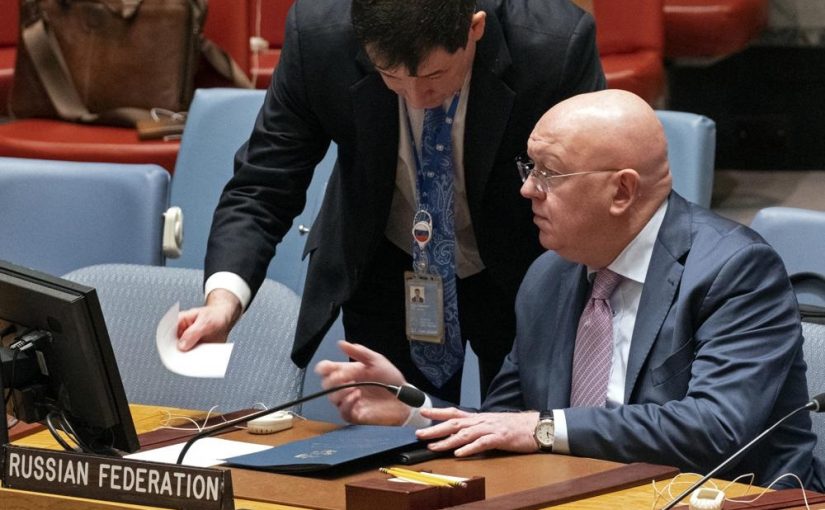
FILE - Russian Ambassador to the United Nations Vasily Nebenzya, seated, speaks with Dmitry Polyanskiy, First Deputy Permanent Representative of the Russian Federation, just before Nebenzya addressed the Security Council during a session to discuss the situation with grain shipments from Ukraine at United Nations headquarters, Monday, Oct. 31, 2022. [File photo: AP/Craig Ruttle]
The U.N. Security Council on Wednesday overwhelmingly rejected Russia’s attempt to establish a commission to investigate its unfounded claims that Ukraine and the United States are carrying out “military biological” activities that violate the convention prohibiting the use of biological weapons.
Russia only got support from China in the vote on its resolution, with the U.S., Britain and France voting “no” and the 10 other council nations abstaining. The resolution was not approved because it failed to get the minimum nine “yes” votes required for adoption.
The 2-3-10 vote reflected the council’s continuing opposition and skepticism about Russia’s actions since its Feb. 24 invasion of Ukraine. The council has been paralyzed from taking any action against Russia’s military offensive because of Russia’s veto power.
Russia circulated the draft resolution and a 310-page document to council members last week alleging that military biological activity is taking place at biological laboratories in Ukraine with support from the U.S. Defense Department.
U.S. Ambassador Linda Thomas-Greenfield countered that the United States voted against the resolution “because it is based on disinformation, dishonesty, bad faith, and a total lack of respect for this body.”
Before the vote, Russia’s Polyansky called the resolution “a considerable milestone” that would show whether the Security Council was prepared to act in line with international law giving state parties to the biological weapons convention the right to seek an investigation at the Security Council.
At a meeting in September of the 197 state parties to the biological weapons convention, she said, “Russia failed to provide any credible evidence to support these false allegations” and an overwhelming number of countries that spoke “considered that the issues raised by Russia were unsubstantiated and had been conclusively addressed.”
But Thomas-Greenfield said that wasn’t enough for Russia and “it inappropriately raised the same false claims here, abusing its position and abusing us.”
Mexico’s deputy ambassador Juan Manuel Gomez Robledo, whose country abstained, said Russia didn’t provide evidence to activate an investigation. He said it was not “realistic” to set up a commission to report in 28 days — and a commission could not be independent and objective if Russia as a council member was included so it would have to be excluded “since it is one of the parties involved in the armed conflict.”
Ukraine does have a network of biological labs that have gotten funding and research support from the U.S. They are owned and operated by Ukraine and are part of an initiative called the Biological Threat Reduction Program that aims to reduce the likelihood of deadly outbreaks, whether natural or manmade. The U.S. efforts date back to work in the 1990s to dismantle the former Soviet Union’s program for weapons of mass destruction.
Thomas-Greenfield, the U.S. ambassador, called the meeting “a colossal waste of time” and said the claims are part of a Moscow “disinformation campaign” that is attempting “to distract from the atrocities Russian forces are carrying out in Ukraine and a desperate tactic to justify an unjustifiable war.”
“Ukraine does not have a biological weapons program,” she said. “The United States does not have a biological weapons program. There are no Ukrainian biological weapons laboratories supported by the United States.”
Russia’s U.N. Ambassador Vassily Nebenzia accused the U.S. of conducting work in Ukraine with deadly pathogens — including cholera, plague, anthrax and influenza — that couldn’t be justified under the guise of public health. He said documents and evidence recovered by Russian authorities suggested a military application.
Thomas-Greenfield countered that Russia’s claims are “absurd for many reasons, including because such species, even if they could be weaponized, would pose as much a threat to the European continent and to Ukraine itself as they would to any other country.”
Russia’s Polyansky told the council Wednesday that regardless of the vote, “the questions to the United States and Ukraine is something that we do retain and the evidence accompanying our complaint still requires clarifications.”
He said Russia will continue to make efforts to establish the facts through the biological weapons convention and any violators will still have to be held accountable by the international community.


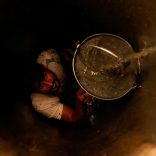
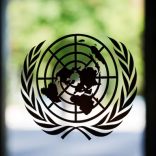
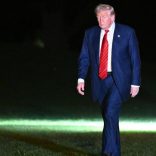


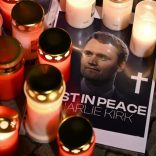





Leave a Reply
Be the First to Comment!
You must be logged in to post a comment.
You must be logged in to post a comment.